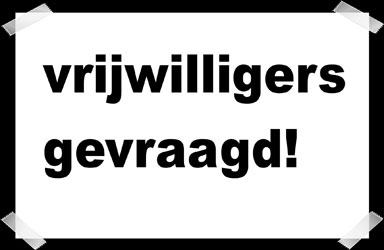Een onderzoeksgroep van de Universiteit van Calgary, onder leiding van dr. Macintosh, gaat een studie verrichten naar het “objektiveren” van post-exertional malaise (toename van klachten na een relatief kleine inspanning, zeer langzaam “herstellen”).
Net als de groep van dr. Snell en dr. VanNess (studies: klik hier, hier en hier) zal ook de onderzoeksgroep van dr. Macintosh patiënten een dubbele inspanningstest (fietstest, herhaald na 24 uur) laten ondergaan.
PERSBERICHT EN NIEUWS….
Een onderzoeksgroep van de Universiteit van Calgary, onder leiding van dr. Macintosh, gaat een studie verrichten naar het “objektiveren” van post-exertional malaise (toename van klachten na een relatief kleine inspanning, zeer langzaam “herstellen”).
Net als de groep van dr. Snell en dr. VanNess (studies: klik hier, hier en hier) zal ook de onderzoeksgroep van dr. Macintosh patiënten een dubbele inspanningstest (fietstest, herhaald na 24 uur) laten ondergaan.
Dr. Eleanor Stein (psychiater en auteur van een zeer informatieve brochure voor haar kollega’s, waarin bijv. de verschillen tussen CVS en depressie: klik hier) zal eveneens in dit onderzoek participeren.
PERSBERICHT
Research seeks test for chronic fatigue
New Kinesiology research hopes to provide definitive test for CFS
One of the most difficult things for people suffering from Chronic Fatigue Syndrome (CFS) is that many believe the condition to be a psychological, not physical affliction.
New research by the Faculty of Kinesiology hopes to measure one of the syndrome’s most obvious symptoms – information that could help doctors in the diagnosis CFS.
“Diagnosis of the syndrome, generally follows eliminating every other possible cause, which leads some to speculate that the condition isn’t real,” says Dr. Brian MacIntosh. “One thing we know is that CFS sufferers feel profound fatigue and worsening of other symptoms following even moderate physical activity. Using our expertise in the field of exercise physiology we believe we can measure this post exertion malaise and say with certainty if an individual has recovered from exercise or if that activity is making them even more fatigued.”
MacIntosh, who is the Faculty of Kinesiology’s Associate Dean of Graduate Studies, is an expert in the area of muscle fatigue. Much of his research has centered on high-performance athletes in peak physical condition, however he says that this research fits in well with his overall area of interest.
“The tools we have developed in high performance sport are perfectly suited to track muscle fatigue in this application so without question we will be able to get some concrete answers,” he says.
The research trial will put CFS patients on a stationary bike to perform a VO2 Max test – similar to trials used to evaluate the fitness level of professional athletes. The individual will pedal to the point of fatigue, at which point researchers will take several measurements including a blood sample in which lactate will be quantified. The next day the patient will return and follow the same workout protocol.
“Most healthy individuals should be able to easily match their performance from the previous day,” MacIntosh explains. “Since CFS patients by definition report profound fatigue from even moderate physical exertion and take greater than 24 hours to recover, we would expect to see a decrease in their physical performance and we should be able to measure that in several ways.”
This work may shed some light on whether the fatigue experienced by people with CFS is primarily in the muscles or in the nervous system.
MacIntosh believes that the results of this work could lead to a definitive diagnosis of CFS, giving another tool in the otherwise limited toolbox of diagnostic tests and perhaps, more importantly, shed some light on the broader issue of human muscle fatigue.
“We’ve all experienced fatigue in our lives,” says MacIntosh. “For example when we have the flu or any similar illness, we feel that fatigue makes our arms and legs feel like they’re made of lead… I’m hoping that this research may lead to a greater understanding of human muscle fatigue in general.”
Macintosh is performing this trial in collaboration with Psychiatrist Dr. Eleanor Stein.
The researchers are looking for people to participate in the experimental trial – both people diagnosed with CFS and healthy subjects (who do not exercise regularly) to act as a control group.
bron:
http://www.kin.ucalgary.ca/wcm/knes/news/cfs_story.html
IN DE MEDIA
CALGARY SUN
U of C tackles fatigue disorder
Wed, December 19, 2007
UPDATED: 2007-12-19 03:50:24 MST
By JENNA MCMURRAY
Researchers at the University of Calgary hope a new trial will shed some light on the often-confusing source of chronic fatigue syndrome.
Experts are trying to determine whether CFS, a debilitating disorder which causes extreme mental and physical exhaustion, is psychological or physiological in origin.
The study will see people suffering from CFS perform a fitness level test on a stationary bike and pedal to the point of fatigue.
When they reach it, researchers will take measurements and a blood sample. The next day, patients will return to perform the same test.
“Most healthy individuals should be able to easily match their performance from the previous day,” said Dr. Brian MacIntosh with the U of C.
http://calsun.canoe.ca/News/Alberta/2007/12/19/4731902-sun.html
Voor andere artikelen die over dit onderwerp verschenen zijn: klik hier en hier.






